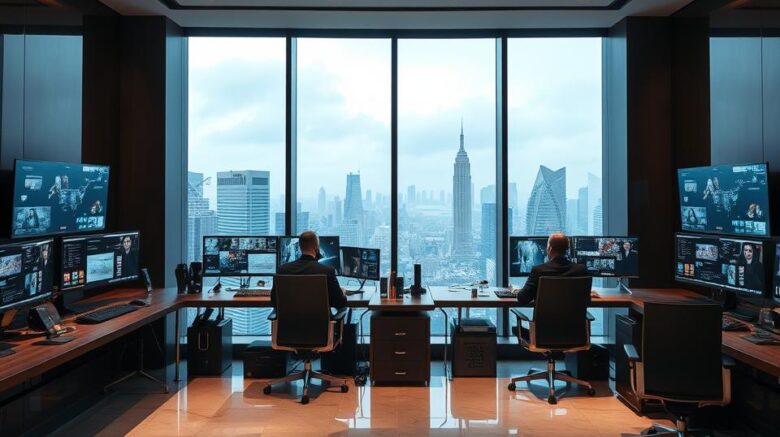Improving Safety via Hospital Security Guards
Did you realize that medical centers experience roughly 30 violent episodes each day? This shocking statistic underscores the crucial function of Hospital Security Guards. They secure patients, employees, and sensitive information. In the rapidly evolving health sector, strong Healthcare Facility Security is paramount. It’s about creating safe spaces where patients can get care without fear of violence or data breaches.
Partnering with experienced firms like Divine Protection Services enhances Medical Center Security Services. This ensures safety is always a top priority, without sacrificing access. This guide looks at how business security approaches and monitoring tools can markedly upgrade safety measures. It addresses both inside and outside dangers efficiently.

Top Highlights
- Hospital Security Guards are essential for safeguarding patients, personnel, and confidential information.
- Healthcare Facility Security is key to preventing violence and securing privacy.
- Combined security systems boost the complete efficiency of hospital safety operations.
- Partnering with companies such as Divine Protection Services delivers personalized security strategies.
- State-of-the-art technologies are the foundation of present-day healthcare security solutions.
- Juxtaposing access and confidentiality is essential for robust hospital safety protocols.
Understanding the Need for Hospital Security
Hospital security is paramount for the well-being of patients and staff and the defense of sensitive data. The increase in aggression within healthcare facilities underscores the necessity for robust Hospital Security Guards. These officers are indispensable for preserving a secure setting and protecting everyone’s rights and dignity.
Implementing effective Healthcare Facility Security strategies is key to preventing aggressive behavior. This supports the creation of a compassionate space, elevating the patient and family experience. It moreover confirms compliance with standards like HIPAA, mandating secure access management to defend Protected Health Information (PHI). These steps not only protect patients but also build confidence between healthcare professionals and their communities.
| Security Measure Type | Value | Regulatory Conformity |
|---|---|---|
| Access Control Systems | Restrict unauthorized entry and access | Vital for meeting HIPAA requirements |
| Surveillance Cameras | Oversee actions and discourage wrongdoing | Aligns with rules for secure environments |
| Emergency Response Plans | Provide quick responses to incidents | Compliant with safety and emergency management guidelines |
| Training for Security Personnel | Prepare personnel with crisis management abilities | Guarantees adherence to security standards |
Allocating resources to strong security protocols and personnel training is vital for safeguarding hospitals and health facilities. These guidelines secure a protected and compliant setting, key to offering top-notch patient services.
Function of Hospital Security Guards
Hospital security personnel perform a critical role in safeguarding hospitals. They supervise entry areas to prevent unauthorized access, address emergencies, and utilize conflict de-escalation to avoid threats. With training from Divine Protection Services, they can spot and manage signs of agitation or violence.
Their visibility is crucial for ensuring the welfare of patients and employees. They protect the hospital’s operations, essential for a healing environment. By delivering security, they enrich patient care and lower risks.
Cutting-Edge Technologies for Hospital Security
Contemporary hospitals are turning to Advanced Technologies to strengthen their protection systems. Medical Center Security Services adeptly incorporate AI-powered cameras to elevate monitoring efficiency. These cameras offer real-time tracking and analysis, enabling staff to identify and respond to threats swiftly.
A fundamental part of Healthcare Security Solutions is utilizing access control systems. These platforms confine access to secure zones, assuring that only credentialed staff reach important areas. Through biometric authentication, healthcare facilities can introduce an additional security tier for patient records and critical medical devices.
AI security solutions play a critical role in physical security. Face recognition and behavior analysis allow security teams to react quickly to security incidents. Enhanced video analytics underpin strategic decisions, ensuring uninterrupted surveillance of medical facilities. This contributes to a protected setting for staff and patients alike.
| Tech Tool | Application | Gains |
|---|---|---|
| AI-driven Surveillance | Live tracking | Quick risk detection |
| Access Control Systems | Controlled access | Protection of sensitive areas |
| Facial Recognition | Personal identification | Blocking illicit entry |
| Video Analytics | Operational oversight | Informed operational choices |
Cutting-Edge Technologies shield hospital belongings and foster a safe environment for all. By allocating resources to these innovative tools, medical centers can stay alert to security risks. This secures quality care delivery for patients.
Healthcare Facility Security Strategies
Successful Healthcare Facility Security plans are critical to protect patients, employees, and guests in hospitals. Executing detailed risk analyses is the basis of these approaches. By pinpointing weaknesses, hospitals can develop tailored protocols for diverse situations. This enhances their preparedness for any potential events.
It’s important to foster the reporting of abnormal behaviors and threats. Hospitals should maintain processes to address such notifications promptly. This forward-thinking approach in Healthcare Facility Security fosters a culture of collective safety.
Visitor management is a critical aspect of Medical Center Security Services. Confirming that only sanctioned people enter maintains a secure atmosphere. Watching over patient-caregiver interactions helps diminish risks. This makes the space safer for everyone. Here is a table summarizing essential parts of robust security strategies.
| Security Component | Overview | Outcomes |
|---|---|---|
| Risk Assessments | Identifying vulnerabilities and assessing possible threats. | Increases readiness and reaction effectiveness. |
| Incident Reporting | Prompting stakeholders to report odd conduct. | Facilitates timely responses to threats and increases awareness. |
| Visitor Management | Procedures for overseeing and regulating facility entry. | Fortifies security and lessens unapproved entry. |
| Staff Training | Providing security training for employees. | Arms employees with skills for responding to security situations. |
Equipping Security Teams Efficiently
Comprehensive education of healthcare security teams is essential for ensuring safety in hospitals. Persistent schooling supports staff in meeting new security challenges. It also boosts their ability to respond well in different situations.
Divine Protection Services focuses on cultivating robust situational awareness among security teams. This includes learning conflict management skills for high-stress interactions. Consistent practice drills and role-play exercises reinforce policies. Employees develop skills to tackle threats promptly while safeguarding dignity and respect.
This method of preparing security staff transcends mere defensive tactics. It cultivates an environment of security and professionalism within medical centers. By focusing on core competencies, hospitals ensure their security teams can handle challenges effectively.
Compliance with Regulatory Standards
Conforming to Regulatory Standards is indispensable for healthcare facilities that prioritize safety and trust. HIPAA, for instance, requires secure access controls to protect Patient Health Information (PHI). These protocols prevent unauthorized access and breaches of sensitive data.
Healthcare facilities can augment their adherence by establishing thorough policies. They involve recurring reviews, personnel instruction, and transparent incident notification procedures. These practices not only safeguard patient health but also cultivate community trust.
Agencies like Divine Protection Services supply bespoke compliance strategies for hospitals. Their knowledge in Hospital Security Services guarantees that security staff are properly prepared to adhere to regulations.
Dedication to compliance lowers risks and forges reliable patient-provider connections. An anticipatory approach to regulations advantages the whole healthcare framework.
Hospital Security Personnel in Action
Hospital Security Officers are vital in keeping healthcare facilities safe. Their efforts appear in numerous practical scenarios, showcasing their anticipatory methods. For example, they manage conflicts in waiting areas, resolving them quickly to prevent violence.
When tensions rise, these guards move people to safe locations, helping them during emergencies. This practice secures those who are vulnerable and upholds a serene atmosphere. Their partnership with law enforcement during emergencies highlights the significance of Professional Healthcare Security. They frequently act as initial responders.
The training from Divine Protection Services prepares these guards to handle emergencies well. They are taught to apply regulations while preserving everyone’s dignity. This fusion of authority with compassion establishes them as indispensable to the healthcare team. They strive to guarantee protection and security for all individuals in the facility.
Customizing Security Solutions for Healthcare Facilities
Medical centers encounter specific security issues that require a customized approach. Adapting Security Solutions is vital for addressing these concerns, providing a secure environment for patients and personnel. Working with experts like Divine Protection Services enables hospitals to create security programs that fit their specific needs.
A comprehensive security plan addresses essential aspects such as violence deterrence and drug security. By using advanced technologies, facilities can boost their safety measures while adhering to HIPAA standards. This often includes visitor management systems and flexible access control solutions that adapt to the facility’s evolving needs.
The duties of Medical Facility Guards are critical as well. They undergo dedicated training to address security events and remain continually alert. Their deployment discourages danger and provides peace of mind to staff and patients.
The table below shows how Customizing Security Solutions addresses various healthcare challenges:
| Issue | Custom Solution |
|---|---|
| Violence Prevention | Educating Medical Facility Guards in conflict de-escalation methods |
| Medication Security | Implementing locked pharmaceutical storage and tracking mechanisms |
| Visitor Management | Advanced visitor screening and badge issuance processes |
| Access Control | Dynamic access control solutions responsive to hospital usage patterns |
By carefully planning and partnering with the right organizations, healthcare facilities can establish a strong security posture. This is achieved through Customizing Security Solutions to their unique requirements. Integrating vigilant human oversight with technological advances markedly raises safety, fostering a secure and streamlined medical setting.
The Bottom Line
Guaranteeing the protection and welfare of patients, employees, and private data is essential in medical centers. Hospital Security Guards today employ cutting-edge technologies and instruction to fight contemporary risks. This advancement not only shields physical premises but also strengthens trust between patients and healthcare professionals.
Tailored Healthcare Security Solutions enable hospitals to lead in the evolving security environment. Working with veteran companies like Divine Protection Services empowers medical facilities to address security issues competently. By combining staff development with leading-edge technology, hospitals can create a secure atmosphere for healing and care.
The healthcare sector faces growing risks, making professional security measures indispensable. Hospitals must adopt these evolving solutions to safeguard their environments and uphold the dignity of their operations.
